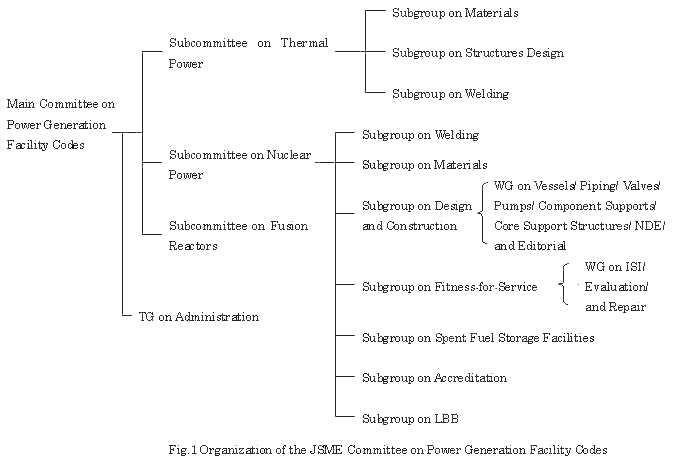JSME Codes for Power Generation Facilities
JSME Codes for Power Generation Facilities
1. JSME Committee on Power Generation Facility Codes
- The Committee is a standing committee.
- The Committee comprises (1) Main Committee, (2) Subcommittees,
(3) Subgroups, (4) Working Groups and (5) Task Groups. (see Fig. 1)
2. Codes established by the JSME Committee
Codes for structural integrates and operational functions of equipment related to mechanical engineering
- Codes for Thermal Power Generation Facilities
- Codes for Nuclear Power Generation Facilities
- Codes for Construction of Spent Nuclear Fuel Storage Facilities
- Codes for Other Nuclear Facilities
3. Publication
(1) Codes published
- Codes for Thermal Power Generation Facilities
- Rules on Thermal Power Generation Facilities
(Japanese)
- Rules on Thermal Power Generation Facilities
- Codes for Nuclear Power Generation Facilities
- Rules on Design and Construction for Nuclear Power Plants
(Japanese)
(contains material, design, and fabrication) - Rules on Fitness-for-Service for Nuclear Power Plants
(Japanese)
(contains flaw evaluation on class 1 components) - Rules on Welding for Nuclear Power Plants
(Japanese)
(contains fabrication on welds, qualification of weld joints, and welders qualification)
- Rules on Design and Construction for Nuclear Power Plants
- Codes for Construction of Spent Nuclear Fuel Storage Facilities
- Rules on Transport / Storage Packagings for Spent Nuclear Fuel
(Japanese)
- Rules on Transport / Storage Packagings for Spent Nuclear Fuel
(2) Codes to be published soon
- Codes for Nuclear Power Generation Facilities
- Rules on Fitness-for-Service for Nuclear Power Plants
(Japanese)
(contains ISI, inspection guideline for reactor internals, and a revision of flaw evaluation) - Rules on Piping Design Code using leak before break
(Japanese)
- Rules on Fitness-for-Service for Nuclear Power Plants
4. Committee Operation
- Committee Operation is in accordance with operating procedures
determined by the committee. - The principles of the operating procedures is:
Openness: Broad spectra of opinions are taken into consideration
for the contents of codes
Transparency: Procedures of establishing the codes including the
process of review are clarified.
Fairness (Balance): Fairness or impartialness to particular individuals,
entrepreneurs, or industries.
Profession: Advance technologies by integrating opinions by
professionals
Agilities: Agile and flexible use of new technologies
Reasonableness: Allow reasonable design based on securing safety
Development: Incentives for evolvement in industries
Globalization: Harmonization with the foreign codes
5. Participation to committee activities, observation of the committee meetings
(1) Participation as a member of the committee
- The member of the JSME committee is a participant as an individual.
- The individual with any nationality can be a member of the committee.
- The member of the committee is appointed based on the recommendation of a member of the JSME committee and following approvals by the JSME committee and the JSME standard boards.
- The retirement of the member of the committee can be made by his own intention.
- A term of the member is two years and can be reappointed four times.
- The member can propose the meeting agenda items.
- Discussion and determination of the meeting is in accordance with the operating procedures.
(2) Participation as an observer
- The meeting is open to the public and anyone can observe the meeting.
- Anyone can propose the meeting agenda items at the time of participation and can tell his opinions under the approval of the chair of the committee.
(3) Others
- Meeting minutes are opens to the public.
- Meeting minutes can be seen in the website.
6. Obligation related to participation to the committee
- The member shall follow the operating procedures and should do business of the committee.
- The member should take participate in every meeting. When he cannot participate, he can appoint his alternate.
- Each participant must pay the transportation and accommodation cost by himself.
- Japanese language is used for correspondence, meeting documents, and used in the meeting.